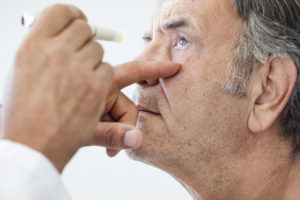Does your family have a history of eye disease? If so, then it’s possible that you might experience the same sort of eye issues. It’s best to learn about them now. 
You can stay on top of it by visiting a doctor on a regular basis who can diagnosis and give you treatment options. Even if eye disease doesn’t run in your family, you’ll probably come down with one of the common eye problems eventually. To keep you informed, here are some common eye problems and symptoms that you may have to deal with at some point in your life and their treatment options.
- Cataracts
You can develop cataracts at any age but for the most part, it only affects those who are over the age of 50. You may have or be coming down with cataracts if you notice a milky, white lens over your eyes.
There are many reasons why you may come down with cataracts. The proteins in your eyes will start to break down eventually as you age. If you have suffered an eye injury or come into contact with UV rays, that can also be the root of the problem.
If you ignore the problem, you could suffer from vision loss. The good news is that cataracts can be treated fairly simply.
Treatment Options
Cataracts is a common eye issue so, it can be handled with surgery. In some cases, surgery isn’t needed. It really depends on how severe your sight loss is and if it’s interfering with your daily life.
- Keratoconus
Your cornea is usually shaped like a sphere but if you have Keratoconus it will deform it into more of a cone shape. This happens because the disease causes the collagen that’s holding the shape together to weaken.
This problem can cause serious vision problems and if you leave it untreated for too long, you’ll need a cornea transplant.
Treatment Options
The cornea transplant is an option that your doctor will try. The first thing that will be recommended is special contacts that will strengthen your corneas and help you see a little better. A second option is collagen crosslinking which will slow down the disease’s progression.
The last solutions is intacs. These are implants that are placed in the eye to help keep the shape in place and again, help your vision.
- Diabetic Retinopathy
The high blood sugar that’s associated with type 1 and 2 diabetes will eventually take a toll on the blood vessels in your eyes. They just won’t be able to get the nutrients that they need to keep your vision acting as normal.
There are several factors that determine your risk for Diabetic Retinopathy. One of them is how often your blood sugar fluctuates. Another is how you maintain your sugar and how long you have had diabetes.
Treatment Options
In most cases, your doctor will recommend that you have laser eye surgery to fix the issue. The one that will be used will be laser photocoagulation. Its purpose is to seal and or destroy the leaking blood vessels.
- Macular Degeneration
Macular degeneration is one of the biggest contributors to blindness. There are several things that can determine your risk for this problem, one of the largest ones being smoking. It also tends to run in the family and affect females more than males.
There is, sadly, no cure for macular degeneration but there are a few things that your doctor may suggest to slow down the progression of it to give you at least a few more years of sight.
Anti-angiogenic Drugs
These drugs are injected right into your eye. You might not like the idea of a needle going into your eye but the medicine can stop new bad blood vessels from forming and reduce the leakage of the blood vessels in your eye that are already leaking.
Laser Therapy
High-intensity laser light has the potential to stop any more abnormal blood vessels from forming in your eye.
Photodynamic Laser Therapy
This is a two-step treatment which involves the surgeon first injecting a light sensitive drug into your eye to damage the abnormal blood vessels. The blood vessels absorb this medication and when the laser is shone into your eye it activates and destroys them.
Vitamins
For patients that suffer through macular degeneration due to their age, they are sometimes prescribed vitamins to slow the risk of vision loss. The vitamins that can help include C, E, beta-carotene, zinc, and copper.
- Refractive Errors
Refractive errors happen when light passes through the cornea and lens of your eye. It can cause your cornea to change shape. To give you an example, common eye issues like nearsightedness and farsightedness are categorized as refractive errors.
Treatment Options
Just as the issue is common, so are the treatment options. You’ll most likely just be given eyeglasses or contacts. You might also have the option to have surgery if you want a more permanent solution to the problem.
- Glaucoma
Glaucoma damages your eye’s optic nerve and this issue just gets worse and worse as time goes on. If you come down with this disease, you can thank genetics because it’s usually inherited. The good news is it won’t show up until later on in your life.
One of the early warning signs is increased pressure in your eye. Once you start feeling this, you’ll want to go see your doctor about it right away.
Treatment Options
Once you’ve visited your doctor and they have diagnosed you, they will suggest surgery, eyedrops, or laser treatments.
- Presbyopia
Presbyopia happens as a natural aging process. If you’re developing it, you’ll notice that it will be harder to read small print or objects that are close to you. When you tell your loved ones about it they may confuse Presbyopia with farsightedness but the two are not the same disease.
Presbyopia happens when your lens loses flexibility, and farsightedness depends on the shape of your eyeball in general.
Treatment
The treatment options are sort of basic. Your doctor will prescribe eyeglasses or contacts. They may also suggest surgery or getting lens implants.
- Floaters
Floaters are usually identified as tiny specs that float in front of your eye. These specs are actually deposits of protein and while they’re annoying they don’t usually get in the way of your vision too much. They do signify worse problems such as retinal detachment especially if you also see light flashes.
If you notice that you are seeing a particularly large amount of specs, it’s important that you see your doctor right away. Sadly, there is no real treatment for floaters but they can at least see if it is the result of a larger problem that can be fixed.
- Dry Eyes
Dry eyes is a very common issue that is associated with your eyes not being able to produce an adequate amount of tears or the quality that they do produce isn’t good enough.
Dry eyes aren’t too serious, but like floaters, it is annoying. You’ll experience redness, itching, and burning. In extremely rare cases you might experience some vision loss but it’s very unlikely.
Treatment Options
You have a couple of treatment options available that can give you some relief, for example, humidifiers aren’t just for when you have a really bad cold. They can also calm down the symptoms of dry eyes. Your doctor may also prescribe special eye drops that can help your eyes produce tears.
If they don’t give you eye drops then they may suggest plugs that can be placed under your tear ducts to calm down tear drainage.
- Tearing
Instead of dry eyes, you may have the opposite of the problem which would be tearing. Tearing happens when your eyes produce way too many tears. Usually, when this happens it means that your eyes are very sensitive to the wind, light, or other temperature changes.
Treatment Options
Wearing a pair of sunglasses when you go out will fix the problem for the most part but you still want to get it checked out because heavy tearing like this can indicate a worse problem like a blocked tear duct or eye infection.
Protect Your Eyes: Common Eye Problems and Symptoms
A lot of eye problems are genetic but you still might develop some of the common ones at some point in your life. It’s best to stay knowledgeable now so you can handle the issue later. Use this guide to common eye problems and symptoms to protect your eyes.
Again, the best way to best treat many of these issues is to routinely see your eye doctor. Contact us to schedule your appointment.









